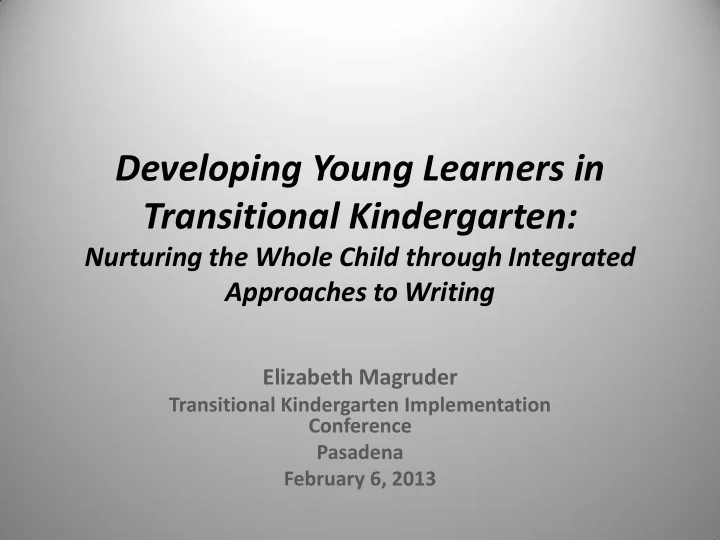

Developing Young Learners in Transitional Kindergarten: Nurturing the Whole Child through Integrated Approaches to Writing Elizabeth Magruder Transitional Kindergarten Implementation Conference Pasadena February 6, 2013
Welcome! Introductions: Meet someone next to or across from you… • Name • District • How long have you been teaching?
Reflection • What are your first memories of writing? • Do you remember when you realized that your written words conveyed meaning? • Do you like to write? Why or Why not? • What is your favorite kind of writing? • What kind of writing do you mostly do? • Are you the “get it down on paper” kind or the “detailed and meticulous” kind or both?
“Children take their very first critical steps toward learning to read and write very early in life.” NAEYC and IRA
As children experiment with language, they begin to associate sound sequences with words and eventually build auditory and visual symbol systems.
Children are masters of reading even before they know “how” to read. In addition, children are aware of print and that it coveys a message.
How Do We Nurture Young Writers? Because children come to school with a diverse range of language experiences, teachers must utilize a variety of approaches and strategies to support and build on what children know.
Let’s Look at What We Know… Social Emotional Cognitive Physical
When I write, this is what is happening… Self image Self regulation Building relationships Making connections Processing Balance Wondering Body strength Analyzing Flexibility Responding Space
Get familiar with the Stages of Writing • Stages of Writing • As children begin to write, their marks can be identified according to stages of writing. Seven stages can be defined for young children: • Scribbling • Mock Handwriting • Mock Letters • Conventional Letters • Invented Spelling • Approximated (Phonetic) Spellings • Conventional Spellings
Help children see themselves as authors!
Use your tools to guide you…
Let’s Dig In! • Walking through the document • Tab sections • Read through pages 33-48 • Debrief: What do you notice? How might this tool help you?
The Union of Reading and Writing Reading and Writing - Never the two shall part
What things do children love to write about? celebrations experiences helpers The same things they love to talk about!
Strategies… Set up a ROUTINE and…Think OUT LOUD!
What are APPROPRIATE routines for TK? Take a few minutes to discuss what are some appropriate writing routines we might put in place…
Think About… Warming up your authors! • Exercises • Letter/word work • Brain food • Visualization • Demeanor
Strategies… • Modeled Writing…
Strategies… • Interactive or Shared Writing…
Spelling… • has value…but NOT at the expense of ideas! • is DEVELOPMENTAL…if taught developmentally! • is best demonstrated interactive settings
Opportunities to Practice Journal Writing… • Let ideas and thoughts flow • Honor any and all attempts • Ask questions that engage • Pull out the smelly pens!
Opportunities to Practice Center-based Writing Provides engaging ways to get the writing going! Pick up & delivery Restaurant orders orders Creating a menu Recipes Writing up the bill
Opportunities to Practice Post Office… Letters Envelopes Stamps Pencils Pens Markers Cash register Postal scales
Opportunities to Practice Document Observations Science Log Record data
Opportunities to Practice Space &Location: Provide places to craft the work Office Space Writing Centers Stations
Opportunities to Practice Provide tools to Support the physical develop writing skills aspects of the process Dough Rolling pins Squeeze balls Stamps Scissors Yarn / bendy sticks Tweezers
Making the Connection… When children recognize that by writing they can make real things happen, they feel the power of their words!
The Power of Their Words… • Making rules • Labeling the Room • Showcasing my name • Making a birthday list • Giving Directions • Creating a “to do” list • Signs and Warnings My writing has a purpose!
Celebrate!! The Author’s Chair I have a voice. I am valued. I feel safe to share. I am a reader and an author!
Analyzing Work Samples Use the Language & Literacy Domain and OTHER strands to analyze student writing… • Where on the continuum is the work reflected? • What instructional goals would you create for this student? • Would other students benefit from this goal? • What instructional delivery system(s) will support this/these students best? • How would you follow up?
Tips for Parents! • Talk with children, engage in conversations! • Read and reread stories with predictable text in home language and English • Encourage children to retell experiences and describe events that are important to them • Provide opportunities for children to draw and print using a variety of tools • Involve them in list making (groceries, to do) • Praise any and all attempts at writing!!!!!!
Keys to Consider… Get excited! MODEL! MODEL! MODEL SOME MORE! Write throughout the day – for different reasons! Provide space, materials, opportunities Don’t stress rules: nurture the process
Remember… The next time someone wonders why children are… • Pounding dough • Squeezing a ball • Painting on a easel • Using tweezers • Filling an entire page with squiggles of color • Using every marker available • Stamping letter “B” over and over again • Drawing, drawing, drawing, and drawing T ell them this… “I am developing young authors!”
“A bird doesn’t sing because it has an answer. It sings because it has a song.” Maya Angelou “As a writer, words are your paint. Use all the colors.” Rhys Alexander “Teach the writer, not the writing.” Lucy Calkins “Writers don’t need to be given fo form rmul ulas as; ; the hey y ne need ed to be e sho hown wn possibilities.” Barry Lane
Thank you! Contact Information: Elizabeth Magruder esmagruder@gmail.com
Recommend
More recommend